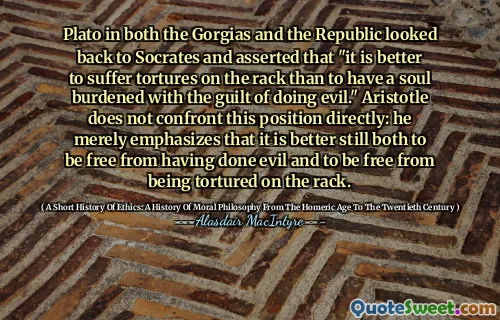
Plato in both the Gorgias and the Republic looked back to Socrates and asserted that "it is better to suffer tortures on the rack than to have a soul burdened with the guilt of doing evil." Aristotle does not confront this position directly: he merely emphasizes that it is better still both to be free from having done evil and to be free from being tortured on the rack.
This quotation profoundly engages with a fundamental ethical dilemma concerning the nature of suffering and moral integrity. Plato, through Socrates, elevates the condition of the soul above physical suffering, asserting that enduring physical pain is preferable to compromising one's moral integrity by committing evil. This perspective places intrinsic value on the purity and righteousness of the soul, suggesting that moral guilt weighs heavier than corporeal torment. It challenges us to prioritize ethical commitments even at great personal cost.
Aristotle's stance, as depicted here, introduces a subtle yet significant shift. Rather than contrasting physical pain with moral guilt, he advocates for a state where one avoids both moral wrongdoing and physical suffering. Aristotle’s position suggests a more harmonious or perhaps pragmatic ideal, where the highest good involves living a life free from both external punishment and internal moral corruption.
Reflecting on these positions, one can appreciate the enduring relevance these ancient perspectives hold for contemporary moral philosophy. They prompt us to consider the priorities we set when faced with ethical choices: is it nobler to endure hardship than to violate our moral principles, or should we aspire to a state of flourishing that precludes both suffering and wrongdoing? The tension between these views invites ongoing reflection about the nature of justice, virtue, and the good life. It highlights how philosophical traditions wrestle with the complexity of human experience, the interplay between physical and moral suffering, and what it truly means to live ethically.






